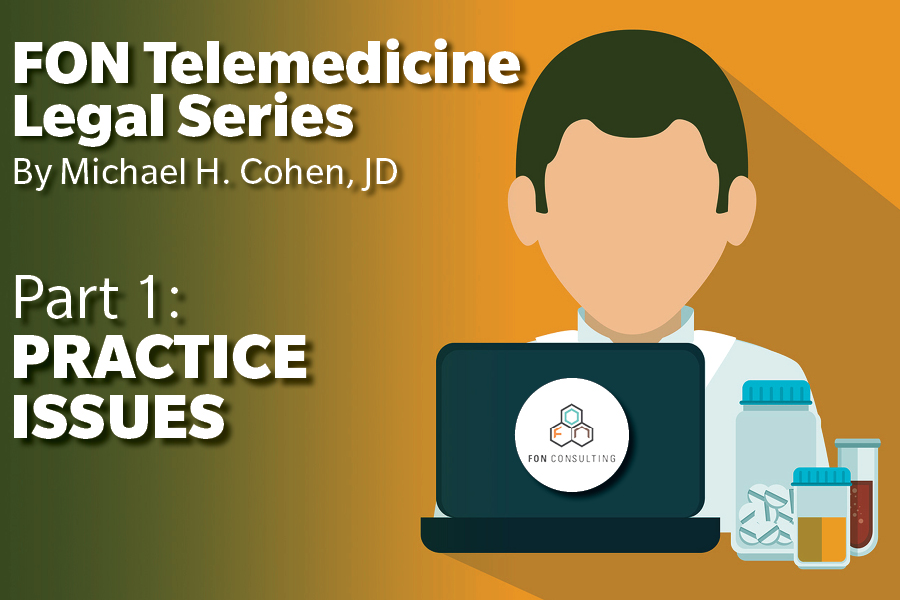Telemedicine Legal Series—Part 1: Practice Issues

In this Series:
Introduction
Part 1: Practice Issues
Part 2: Licensing Issues
Part 3: e-Prescribing
Part 4: Standard of Care Issues
Part 5: HIPAA Issues
Part 6: Mobile Medical Apps
Part 7: Unlicensed Practice, Fee-Splitting, and other Legal Hazards
Conclusion
What is the difference between telehealth and telemedicine, and simply delivering educational tools online? Can practitioners offer webinars and other online health informational services without being subject to laws governing both the practice of medicine and other healthcare professions?
Dealing with Antiquated Laws and Modern Corrections
Healthcare providers who move beyond a brick-and-mortar physical practice often find themselves in a legal gray zone, wondering whether they are compliant, or even what rules might apply.
This confusion is understandable. The laws governing medicine were first framed in the late 19th century and were slowly adapted to advancing medicine and treatments; technological progress has always moved faster than laws can evolve.
The result is that:
- Some states have statutes regulating telemedicine but only apply them to the practice of medicine (at a distance). They do not address, for example, telepsychology.
- Others include in their legal definition of telehealth any clinical practice online. But these legal rules are ambiguous as to who can practice and under what circumstances or constraints.
- In states where no statutes exist, medical or other regulatory boards have issued regulations. These have to be carefully consulted; one board’s policies may differ from another’s. Furthermore, there are states where there is no explicit regulation, which means one has to apply existing laws which preceded the development of the Internet.
The upshot is that before embarking on your telemedicine venture, it’s important to review the laws and legal rules in your state that apply to your clinical practice as well as to the business model you intend. This will be a matter of interpretation and analysis; the trail of legal breadcrumbs must be traced as clearly as possible.
Legal Definitions Can Make a Difference
Telemedicine definitions not only vary by state, but across federal and state agencies, which can regulate various aspects of telehealth practice.
For example:
- The Centers for Medicare Services (CMS) defines telemedicine as the provision of clinical services to patients by practitioners from a distance via electronic communications.
- The Joint Commission on the Accreditation of Hospital Organizations (JCAHO) defines telehealth as the use of electronic information and telecommunication technologies to support long-distance clinical health care, patient and professional health-related education, public health, and health administration.
- JCAHO defines telemedicine as the use of medical information from one site to another via electronic communications to improve patients’ health status. JCAHO thus considers telemedicine a subset of telehealth.
- Videoconferencing is telemedicine. But in many states, electronic communications that do not involve video are not considered telemedicine. For example, in California, information consultations between practitioners, telephone conversation, email, instant messaging (IM), or fax are not considered “telemedicine” and therefore not subject to the telemedicine laws.
- Similarly, in Virginia, “telemedicine services” do not include an audio-only telephone, electronic mail message, facsimile transmission, or online questionnaire. Likewise, Florida provides, “Telemedicine shall not include the provision of health care services only through an audio only telephone, email messages, text messages, facsimile transmission, U.S. Mail or other parcel service, or any combination thereof.”
Adding to the epistemological chaos, telemedicine can be: (1) non-simultaneous—such as radiology services, which are read later, after the patient undergoes the imaging (“asynchronous”), or (2) simultaneous (“real-time” or “synchronous”). If you see these terms in a telemedicine statute, you’ll now know what they mean.
Which Legal Definition Matters?
It depends on your purpose. For example, obviously you would care about California’s legal definitions if you are a California physician, or if you are planning to treat a patient located in California, but what about the CMS rules?
What CMS has to say is particularly relevant if you are a hospital interested in credentialing telemedicine practitioners. CMS’s telemedicine rule allows hospitals and critical access hospitals (“CAH”) to rely on the credentialing and privileging decisions of another (distant site) hospital or another telemedicine entity.
CMS distinguishes the distant-site hospital (which is providing the services), and the distant-site telemedicine entity. The latter may not necessarily be Medicare participating. There must be a written agreement between the two entities that includes, among other things, a compliant credentialing plan along with an agreement that the hospital that credentials and privileges the distant-site practitioner shares the practitioner’s performance review information with the distant-site hospital. The regulations are easier for a distant-site telemedicine entity, which makes sense because such an entity is itself less regulated than a Medicare-participating hospital.
Online Practice Vs. Education & Information
Generally, healthcare providers who ask our law firm for legal advice about telemedicine fall into these categories:
- The physician or other healthcare provider has a brick-and-mortar, clinical practice and wants to continue treating his or her patients after they arrive in another state.
- The physician or other healthcare provider has a brick-and-mortar, clinical practice and has a specialized practice (for example: nutritional consults; fertility consults; lifestyle advice; functional medicine wellness approach and wants to offer these across all states).
- The physician or other healthcare provider does not have a brick-and-mortar, clinical practice, or wants to give up his or her practice, and wants to offer advice of an educational nature (not diagnostic or treatment advice, and not in the context of a provider-patient relationship) across states. This could be in the form of a webinar, one-on-one health coaching, email and text support.
Sometimes this can involve an MD who wants to take off his or her physician’s hat and function as an ‘educator’ or ‘coach’.
While each of these situations differ, they all involve an interpretation of what it means to have a clinical practice, as opposed to providing information and education.
The reason is that the law allows people to disseminate information online (we call that “free speech”), but regulates professional healthcare practice.
Perhaps the easiest way to focus on what constitutes professional healthcare practice is to look at the legal definition of practicing “medicine.” Although the exact definition differs from state to state, “medicine” typically involves diagnosis and treatment of disease.
If, for example, you put out a blog saying that, if a person eats a hundred donuts every week, his or her body will start to resemble a donut (meaning rotund), this is considered education and information. But if someone pays you for a session during which you tell that person he or she is obese, and you suggest prescription appetite suppressants, this clearly falls into the arena of medical practice.
The problem is that there can be a slippery slope between education and practice, particularly when advising individuals about their specific physical or mental health challenges. This makes “health coaching” a legally risky area, despite the fact that the practice is widespread. Regulators, investigators, prosecutors, and judges tend to interpret diagnosis and treatment quite liberally, encompassing a variety of activities.
The physician who wants to continue treating patients as they travel into another state has to understand the licensing rules (see Part 2); while the clinician who wants to offer specialized advice needs a legal assessment as to whether his or her second ‘hat’ is educational or clinical; and the healthcare provider who wants to do webinars or health coaching has to carefully structure the business to attempt to avoid the broad sweep of legal definitions of practice.
At least one state, Arkansas, has made it easier for physicians in the second and third category. The new telemedicine statute in Arkansas says that simply providing information of a generic nature, not meant to be specific to an individual patient, does not require a professional relationship.
But what is “generic” information?
Think of myriad companies offering health advice online—not in the context of an individual consult—and you probably have “generic” online information. This would be our ‘eating too many donuts is generally contraindicated for most people’ example.
Conclusion
Practicing telehealth and telemedicine requires a nuanced look at the exact nature of the practitioner’s plans, and the applicable law. One thing we can count on is an ever-changing legal landscape. As practices evolve, so do legal rules and enforcement priorities. At the moment, there’s a slippery slope between information and education on one hand, and clinical practice on the other. Legal advice will not only serve to assess your own compliance, but allow for the development of a thoughtful strategy as you follow the opportunities technology provides.
Contact the Michael H. Cohen Law Group for a telemedicine legal consult that fits your particular business model.
Reading this article does not create an attorney-client relationship with its author or with the Michael H. Cohen Law Group. This is an informational and educational piece; it does not constitute legal advice. If you’d like legal advice, consult an attorney for advice specific to your situation.
About FON
FON is a leading integrative health and medicine business development and strategy consulting firm. FON specializes in custom solutions for growing patient volume, developing programs, and increasing product sales. Our practical business models are driven by innovative marketing, clear messaging, and customer engagement via branded storytelling.
Contact us today to schedule a complimentary 30-minute consultation to discuss your business development or personal brand needs.
The Michael H. Cohen Law Group counsels health technology companies and providers on healthcare legal issues and FDA legal and regulatory matters. Legal counsel includes corporate and transactional healthcare matters, healthcare regulatory compliance, and healthcare litigation and dispute resolution. Attorney Michael H. Cohen is an internationally recognized author, speaker on healthcare law and FDA law, and expert in developing legal strategies for healthcare ventures, including integrative medicine, anti-aging and functional medicine, telemedicine and concierge medicine.





















